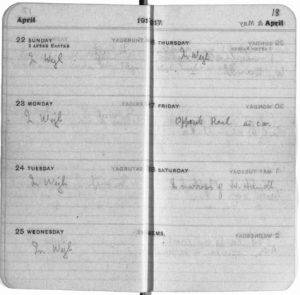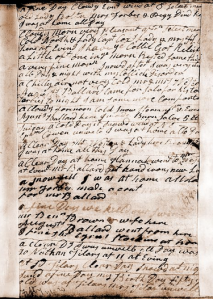Part 2 in the series. Read Part 1: “Don’t Burn your Diary! Why you shouldn’t destroy your personal writing.”
Okay, you’re still not persuaded. Let’s talk about why.
My diary is silly. I wrote it when I was young/depressed/in love and the contents are cringeworthy and have no inherent literary or historical value. Trust me! No one wants to read my diary!
I’m not going to try to persuade you that your diary is a staggering work of literary genius. There is a good chance that your diary does have silly moments – I know mine does. So, accepting that your diary is silly – that maybe there are one too many entries detailing the physical attributes of a new lover, or dwelling on how sad you are, or recounting fights in your high school clique that seemed urgently important at the time – does that still mean you should destroy it?
I don’t think so. What looks silly or childish or solipsistic to you now may be a delight to you in the future – and may be equally delightful to a future reader. You wrote what you did because that’s where you were at the time. It may be tempting to retroactively edit yourself and cover over those less-than-exceptional moments, but in doing so you deny a truth about yourself.
My diary is shameful. I wrote about some really embarrassing acts/activities, the kind of thing that I would be mortified for my kids to learn about. Or, I did some really terrible, petty things to other people, and I don’t want anyone to know what I am capable of. This is information that no one would benefit from knowing.
Once again, I am not going to try to convince you that what you did wasn’t shameful – maybe it was. Probably you are not the first to have ever done it – yes, even that sex act/activity that you don’t want anyone else to know about. But, okay, so you did something and now you’d like to make sure that no one ever reads about it.
But, consider this: you wrote about it. The impulse to record was sufficient to overcome your embarrassment. Surely that tells you something? Surely that suggests that it was important enough to you to deserve to be included in your life narrative? If you have any intention of conveying a full picture of yourself in you diary, you’ve got to include the bad alongside the good, the shameful as well as the celebratory.
And, you can control who reads it. Maybe you’re concerned about a specific audience: your partner, spouse, children, or heirs? That’s legitimate. But, there are specific steps you can take to make sure they don’t read your diary, that stop short of destroying it. Don’t give into the temptation to rewrite your life, to buff up your self-image retroactively, rather than to honor the original diaristic impulse to write it down and acknowledge the darker shades of yourself.
I wrote it for myself. Keeping a diary or journaling was always just for me, a way to process my experiences and work through my thoughts. I never intended to have an audience and even the prospect of a reader in the distant future changes my thinking about my diary/journal, so I don’t want to even consider it.
I admit I find it hard to believe that anyone writes a diary or journal without considering a possible reader. Maybe I’ve just read too many diaries in my research; it’s impossible for me to not think, however vaguely, about the possibility that someone will read my diary at some point in the future. And, so many of the diaries I’ve read have moments when the diarists betray a similar self-consciousness, acknowledging an imagined reader.

T.E. Lawrence’s diary, in which nothing appears to happen.
But, okay, let’s say you are a diarist who has a strong sense of yourself as writing in a state of isolation: in dialogue with yourself and no one else. That doesn’t mean you shouldn’t consider what will happen after your death. In fact, you can take steps to make sure that your diary will remain restricted – at least for a period of time and from the readers you most do not want to have access to your writing.
But, I also think it may be time for you to acknowledge to yourself that by virtue of writing your thoughts down, you’ve made them available to others – and that an audience (even an imaginary or distant one) may be more formative to your thinking than you’ve admitted to yourself. No one is an island, as the saying goes, and considering the diary as a more social or communicative form of writing is one way of exploring the ways in which your individual life story is bound up with many, many others.
I am not important. My life is really ordinary and my diary reflects the mundane nature of my day-to-day life. It would be incredibly boring for anyone else to read. Really, no one would be interested!
You’d be amazed at what readers and, especially, scholars find interesting. In her research on an eighteenth-century midwife’s diary, Harvard historian Laurel Thatcher Ulrich discovered an unparalleled record of early American life. I am sure the midwife, Martha Ballard, did not think she was historically significant; she certainly didn’t write a diary with the intention of making it entertaining or scintillating to anyone else. And, as a result, to many readers, her diary was boring and unreadable. Under Ulrich’s careful and respectful analysis, however, it was revealed to be a treasure trove of historical information.

A page of Martha Ballard’s diary
So, you never know whether what you write will be important. What looks ordinary or boring to you may end up being the kind of clue that enables a descendant or historian to piece together the essence of your life or your moment in time.
I’ve never thought about what would happen to my personal writing after I die and I don’t want to now.
Okay, I get it. Pre-death planning is a bummer. But, not planning guarantees that someone else will decide for you – and it almost certainly means that your papers will not be preserved with care or with archival skill. Plus, I’ve written this, which will make planning incredibly easy: Part 3: “How to Make Sure Your Diary Doesn’t End Up in the Trash.”
Pingback: Don’t Burn your Diary! | The Diary Index
Pingback: How to Make Sure Your Diaries Don’t End Up in the Trash | The Diary Index